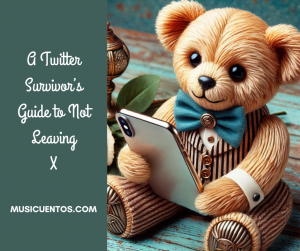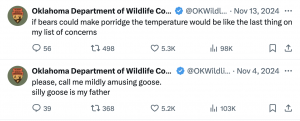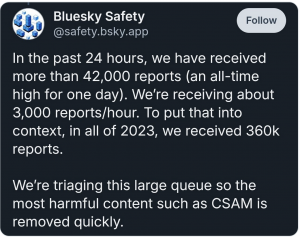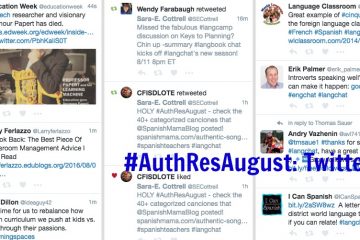If you have (or have thought about) quitting a social media platform or jumping from one to another in search of an elusive sense of community, this post is for you.
In June 2009, the same month that Elon Musk created a Twitter account, so did I. I didn’t do much with it. I think my husband suggested it to me. Then, I went to my state conference that fall, where professional challenger Thomas Sauer asked me if I had an account, and had I heard about #edchat? At least, that’s how I remember it. It was, after all, 15 years ago.
I do not exaggerate when I say that Twitter changed my professional life. Over the years, it became the professional community I desperately needed. I was a lone teacher trying to build a language program at my school. I was inspired to be a better teacher and to help others. Then, in January 2011, 14 years ago this month, we started #langchat, and oh my, wasn’t that the golden age of language teacher Twitter?
Like almost every avenue of discourse in our country, our community’s decline on Twitter started before we all had the name of Donald Trump on our lips. Back then, I think we knew deep down that we, collectively, were the real problem. Far too many of us lack self control. We continually unleash our most critical, biting, offensive thoughts when we’re hiding behind a keyboard. Talking to people who are little more than avatars to us brings out our worst side.
Need proof? Within 10 months of starting #langchat, we were already having so many clashes that this is what I wrote.
Everyone deserves respect, face-to-face and online. Respect me, and give me the benefit of the doubt. Bring problems with me, to me.
I tried to stay and I tried to help, to create a respectful space where we could all become a part of each other’s journey to be a better teacher. I posted about Twitter lingo, shared lots of authentic resources. We read books together, we tweeted conference after conference together. We presented the chat at ACTFL. I tried for years.
But when we lose sight of the fact that “free speech” doesn’t mean “freedom from speech I don’t like,” we tend to get huffy. When we forget that the screen between me and you doesn’t make either of us less of a person, we may get nasty. When we don’t pay attention to the tools that help curate the feed to fit what we need, we deflate. We give up.
Everyone knew social media was off the rails. We’ve known it since long before people started talking about banning accounts for minors or banning TikTok altogether or writing books about The Anxious Generation. In 2018, The New York Times called it “the high school we can’t log of off.” It was always that.
Except, I told everyone, you can log off of it. And I did. I left. In the summer of 2020, Independence Day in fact, I signed off.
So, how did I end up back? It’s a long story, involving quitting the best job I ever had, and getting involved in politics, which led me to create an account for that. And then Amtrak accidentally tweeted the word “trains,” just that, and it became a viral thing. It’s time, I thought. Time to find Musicuentos again. Being still resolved to not use social media with a purpose of making friends, I left my personal account dead. I used my lesser-known Musicuentos account. I tweeted one word.

It had been two years.

What changed? I’d come to believe that I’d known the answer all along: it was always to ooze empathy. I could make it work for me.
Now, we find ourselves on the other end of more wildly contentious national events. Twitter was sold to Elon Musk, who rebranded it as X, and a massive change commenced. Many of the people who had built and sustained this beautiful, messy online community we called #langchat left for other platforms, Threads mostly, I think. Having staunchly resolved that another social media platform was the last thing I needed in my life, I stayed.
Then, Donald Trump was elected again. By now we’ve thrown around the words “unprecedented” and “like never before” so much that they mean little. Still, a staggering number of people thought that canceling their account on Trump supporter Musk’s platform would be an effective protest. This time, many fled to open-source microblogging platform Bluesky.
Twitter or X, Threads or Bluesky, none of them will be a community that is your happy place. Progress here is only possible when we realize that social media will never replace the work of building real relationships, and real relationships have always been messy, and that’s totally worth it. I invite you to stay. And I offer some advice for how to make that as productive (and maybe peaceful?) as possible.
Hanging out on Facebook? Join me there.
1. Tailor your content.
The thing about these platforms is that they want you to stay. In order to get you to stay, they’ll show you more of what they think you want to see. How do they know what you want to see? You tell them, by how much time you spend watching that video, by whether you repost or click the heart, by whether you engage in the conversation. That’s the way algorithms work: they track your behavior, then try to capitalize on it to keep you there. So, my first tip is for you to tell the algorithm useful things. There are a several ways you can do that.
-
One account, one focus.
Talk about things you love and not just things you hate. Really, think about focusing on one thing you love. Not all of the time, but most. If you want to talk about something else, create a different account.
I like talking politics. I’m part of my local party’s executive council and I ran for State Representative twice. I want to improve the political conversation in this country. But I don’t want my teacher feed to be about politics. I actually don’t want to talk politics with my language teacher friends. So, I have a separate account for politics. I use my Musicuentos account strictly for education content.
Bottom line, the more you talk about one thing, the more the platform will show you that. (Or, it should.)
-
Mute, don’t block.
For the love of all peace and harmony, don’t block people. It just fosters more drama, because at least on X, it’s very easy to see that someone has blocked you. Then, you post a screenshot of the fact that they blocked you, and it just fosters more drama.
Instead, mute indiscriminately. X has this lovely mute feature, in which you don’t see a particular person’s posts. Rather, you see a notice that “this post is from an account you muted,” and you can choose to override the feature and see the post. (Don’t.)
I mute people I’d wave and smile at and sit next to at ACTFL. I disagree with them on so many levels, the benefit of engaging them on X doesn’t outweigh the risks of a tense (at best) conversation drowned in the lack of context and accountability that is social media. Mute me. I’ll never know, and you’ll live protected from whatever it is about me that bothers you.
Last year, I had become frustrated trying to dialogue with a particularly immature politician, one running in my district, trying to be on my ballot. When I asked her to stop calling me “sweetheart,” she just doubled down, and if I ever replied to her or mentioned her platform, she’d accuse me of obsessing over her. (I’ve noticed that people out of valid points often use this strategy to shut down an argument on social media.) I muted her, and voilà, more peaceful timeline.
Don’t just mute people. Mute words. During the election, I muted the words “Trump” and “Kamala” (yes, even on my political account). It’s amazing how much that simple step decreased the tension on my timeline. I didn’t care what anyone on X had to say about either of them, so why let the platform show me that?
Mute “bitcoin” and “porn.” Mute “TPRS” if you think we’re a weird cult, mute ACTFL if you’re mad about executive shakeups, mute whatever you want. Mute TPT. (Also use the “not interested” function that X, for example, offers.) You can curate your own feed into something that is really tailored to what inspires, challenges, and educates you.
-
Make use of the hearts.
Another way to make the algorithm work for you by clicking the heart or whatever “like” button is used on your chosen platform. Spend time reading a post, watching a video that uplifts you. Then, like it, and occasionally, repost one. I recommend the feeds of state Departments of Wildlife.

Animal video and photo accounts like WeRateDogs are another source of laughter and joy. Try NASA. And ACTFL, and TPRS, and me. If muting and “not interested” shows the platform what you don’t want to see, seconds dwelling on a post and using the like and repost features tells it what you do want to see.
Be a source of empathy.
Allow me to repeat some advice in my 2017 resolution post on empathy, and add to it:
- Remember you are talking to a person, not to pedagogy. Talking to inanimate objects isn’t a conversation.
- Related, use your real name and picture. The more people use their name and photo, the more they police their own content, because people naturally want to promote a positive view of themselves.
- Also related, refuse to engage with bots and anonymous accounts. 99% of the time, if you don’t use your name and photo, I will not interact with you, because it usually means you’re using the medium to unleash the worst version of yourself.
- Resist the urge to lecture. Ask a question, read the answer, don’t jump to conclusions.
Honestly, leaving a platform because people say things you don’t like doesn’t make sense. It’s what authoritarian regimes do, not American teachers. Choosing to affiliate only with people who are like you makes you part of an echo chamber that exactly mirrors the one you thought you were leaving.
The only way you can fix the echo chamber is to stay.
So Elon Musk bought Twitter and renamed it, so what? So he endorsed the candidate you hate, and what of it? When you see something that makes you think, I want this out of my content, take a deep breath, say “Thank God we live in a country with free speech, but that is some crazy twisted free speech,” and then mute. Mute and mute some more.
You can’t escape the crazy. The thing about free speech in the country is you can only guideline it so much. The crazy will follow you wherever you’re going. The sooner we learn to sideline it without sidelining ourselves, the better our communities will be.
You may have left X for “bluer skies” but blue skies never stay that way. And come on, my language teacher community, we know this better than most. Remember Wikispaces? PhotoPeach? Remember Flipgrid? TodaysMeet? inkleWriter? Padlet? (Check out Matt’s post on paying for digital classroom tools.)
Free, open-source technology is not a sustainable model. Unless someone is paying something and restricting something, it’s going to turn paid or restrictive, or it’s going to die. Either there will be restricted access (ChatGPT), subscription fees (Padlet), fundraising (Wikipedia), or advertising (YouTube, X, Facebook).
It took about ten minutes for the peace to break on BlueSky. People fled X, but then they found more of what they didn’t like on BlueSky. Much of the feed is taken up with screenshots from X! Also, users were reporting content so fast and furiously that it broke the system:

(CSAM stands for Child Sexual Abuse Material). Here’s the thing: if there’s no money involved, who is going to monitor reports? Who’s going to take down content promoting sexual abuse? The AI doesn’t care. It’ll boot you off as soon as it will the person you disagree with.
This line from the above-referenced 2018 opinion piece at the NYT about Twitter, you can replace it with any social media and say the same thing.
Twitter is a dark reservoir of hatred, home to the diseased national id. It turns us into our worst selves — dehumanizing us, deranging us, keying us up, beating us down, turning us into shrieking outrage monkeys hellbent on the innocents of Oz.
I lasted on Reddit for approximately 3 days before I couldn’t take how the anonymity contributed to the most insulting online community I’d ever seen.
It takes a human making a salary to help make your online platform a safe place to be (I mean literally safe, not what we’ve come to call “safe,” meaning you don’t get to say anything that hurts my feelings).
Bottom line: If you learn to curate your feed and filter the noise, before you know it, you’ll have what we used to have and what made us all better teachers: a feed of people who
1) know how to answer a question thoughtfully,
2) know how to disagree respectfully, and
3) want you and all of us to be the best teachers we can be.


